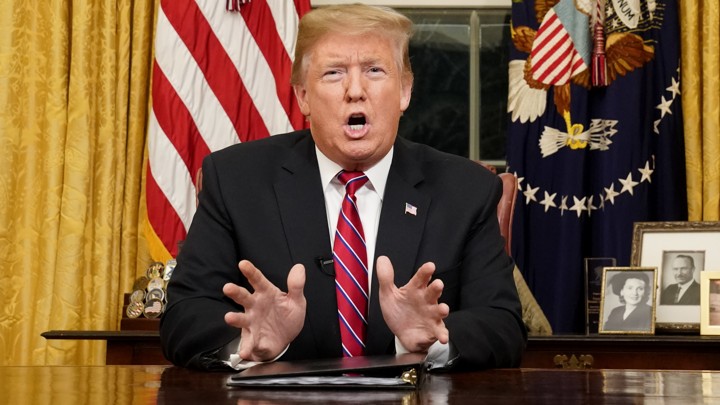WASHINGTON, January 9, 2019 — As the second-longest government shutdown in American history enters its third week, President Trump on Tuesday attempted to galvanize public support for his unpopular proposal to build a wall at the country’s southern border with a televised, prime-time address to the nation.
After the broadcast networks broke into their regularly-scheduled programming, the president appeared on screen shortly after 9 p.m. to address his fellow Americans about what he called “a growing humanitarian and security crisis at our southern border,” caused by “thousands of illegal immigrants trying to enter our country.”
Trump spoke while sitting at the Resolute desk, behind which past presidents have delivered televised remarks at pivotal moments in history. These include John F. Kennedy’s warning to the Soviets during the Cuban Missile Crisis, Lyndon Johnson’s declining to seek a second full term, and Richard Nixon’s announcing his resignation amidst the turmoil of Watergate, Gerald Ford’s putting an end to the “long national nightmare” by pardoning Nixon days later, Ronald Reagan’s consoling Americans after Challenger disaster, and George W. Bush’s comforting and reassuring a traumatized nation after the 9/11 terrorist attacks.
Unlike those singular examples of presidential oratory, Trump’s ten-minute-long speech broke no new ground.
Mischaracterizations and falsehoods began almost immediately, with the president’s claim that Customs and Border Protection officers encounter “thousands of illegal immigrants trying to enter the country each day.”
The president then attempted to draw a line from the number of aliens — legal and otherwise — arrested by Immigration and Customs Enforcement officers to a claimed epidemic of violent crime resulting from the lack of a physical barrier along the U.S.-Mexico border.
“Over the years, thousands of Americans have been brutally killed by those who illegally entered our country, and thousands more lives will be lost if we don’t act right now,” he said.
Trump also attempted to tie current immigration and border security policies to the nationwide opioid epidemic by repeating his claim that the lack of a border wall has turned the southern border into “a pipeline for vast quantities of illegal drugs, including meth, heroin, cocaine, and fentanyl.”
Trump has frequently suggested that the fentanyl responsible for so many overdose deaths is brought into the United States from Mexico despite the fact that the vast majority of fentanyl sold on American streets comes from Chinese manufacturers and makes its way to the U.S. through the mail or through ports of entry.
Numerous studies have found that immigrants, regardless of status, commit crimes at far lower rates than native-born Americans. Moreover, most drug smuggling — and drug seizures by Customs and Border Protection officers — takes places at ports of entry.
While Trump’s use of the phrase “illegal immigration” brings to mind the image of men and women furtively crossing the border by evading border patrol officers, administration officials openly admit that the number of actual illegal immigrants caught while attempting to cross the border has been on the decline for years. In fact, it is the lowest it has been in decades.
Most people who are residing in the United States illegally came here not through a furtive dash through the desert, but through a passport line on a tourist visa.
Trump also invoked the scourge of human smugglers known as “coyotes” while claiming that 20,000 children “were illegally brought into the country” last month. But as the children in question were granted legal status while their asylum claims are pending, this claim falls flat.
Asked why the president continues to deliberately mischaracterize persons exercising the right to claim asylum in the U.S. as “illegal immigrants,” Counselor to the President Kellyanne Conway said Wednesday that such a distinction was nothing more than “semantics” because “not everyone who presents a claim of fear has a credible claim of fear.”
Conway complained that under current law, families seeking asylum are required to be released into the United States during the pendency of their claims.
When it was pointed out to Conway that the asylum process is a legal method of immigrating to the United States, she told reporters that “that’s not true” because Mexico is a “safe third country” from which immigrants could apply for asylum. “Under the law, they could certainly stay there while their claims are being processed.”.
While the 1996 Illegal Immigration Reform and Responsibility Act bars asylum to aliens who can be returned to a “safe third country,” the Immigration and Nationality Act requires a bilateral or multilateral agreement to be in place between the United States and that country before the 1996 law can be invoked to deny anyone asylum.
The U.S. has a “safe third country” agreement with Canada, but no such agreement exists between the U.S. and Mexico.
When pressed further, Conway again tried to deny that the asylum process is a legal one, telling BeltwayBreakfast: “As a woman, as a mother, I don’t want these kids raped, trafficked, getting into drugs. I care about the kids on that side on the border, I care about kids on this side of the border, and I think it’s high time that people rise above the partisanship and agree on that very basic point,” she said.

